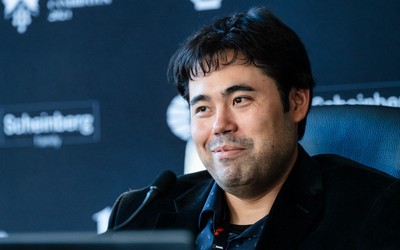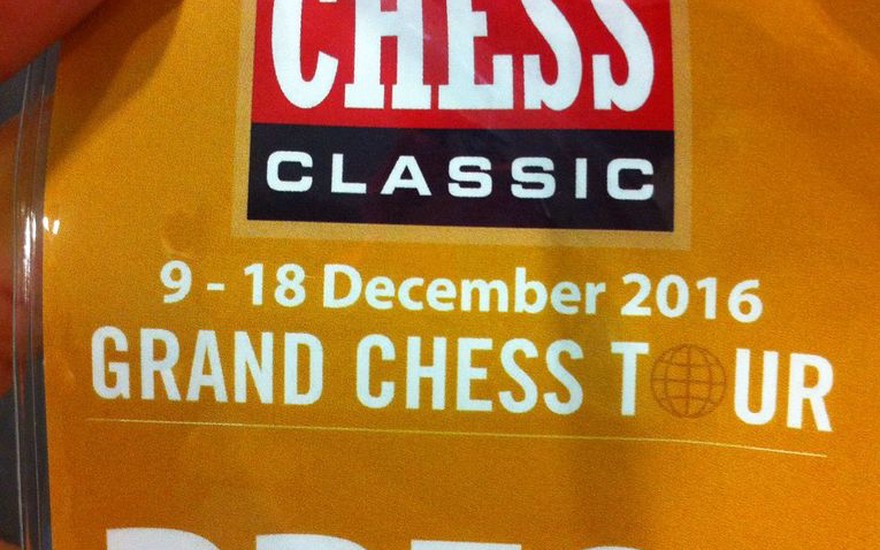
London Chess Classic: Round 1
Highlights from Round 1 of the London Chess Classic 2016, the final leg of the Grand Chess Tour.It is a testament to the increasing popularity of lichess that, having covered the World Chess Championship 2016 (Carlsen vs Karjakin if you were living under a rock), lichess was equally invited to cover the London Chess Classic, the last leg of the Grand Chess Tour. I was fortunate enough to sit in an air conditioned VIP analysis room alongside journalists, older or less active grandmasters, the coaches, business men and those who run and organise national and international chess federations.
Featuring eight of the world's top 10 players (barring only the aforementioned Carlsen and Karjakin), with the other two players being Veselin Topalov (a former FIDE World Chess Champion, #15 in the world) and wildcard Michael Adams. (the top British player, and a not too shabby #19 in the world) Not a single player came from beneath the top 20 players in the world. For such a strong pedigree, the chess was of a curiously mistake-ridden standard.
Hikaru Nakamura (USA 2779) vs Wesley So (USA 2794)
The best example of this came from Hikaru Nakamura (USA 2779) v Wesley So (USA 2794). Nakamura looked languid and relaxed in the auditorium, playing white in a Grünfeld Defence (7..Be3 8. Rc1) -- without much consternation. On move 13, however, Nakamura, after some deliberation, played Ne2. Almost immediately, there was a ripple of consternation through the auditorium. Whilst materially, the move kept things equal, Nakamura sacrificed his castling rights, consigned his knight on e2 to an inactive square, and had a weak pawn chain starting on c4. By comparison, So had a strong bishop pair, a partially exposed but castled king, and easy to protect pawn chains. By move 15, Nakamura had realised the extent of his miscalculation, and disappeared for several minutes. When he returned, he looked ashen faced, but played on until resigning in a hopelessly lost position on move 29.
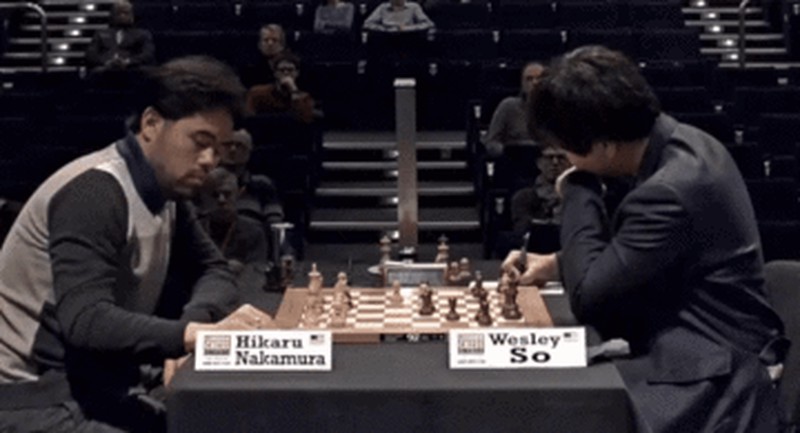
(All credit to https://twitter.com/OlimpiuUrcan)
Nakamura, well known for going on "tilt" (a poker term where a loss, or series of losses, impairs your objective thinking and/or makes you angry), did not attend the press conference afterward. Unlike Carlsen's fantastic birthday earlier this year (when he won the World Chess Championship), this will be a birthday Nakamura might want to forget. For So, on the other hand, this win puts him tantalisingly close to becoming only the 16th player to break the 2800 mark, with his live FIDE rating now at 2798.8.
https://lichess.org/study/QkqbvW0f/GoF4lfq9
Vladimir Kramnik (RUS 2809) v Veselin Topalov (BUL 2760)
This particular matchup is always anticipated when it comes, with Kramnik and Topalov, with "toiletgate" back in the 2006 World Championship having created an unmistakable feud and rivalry between these two greats. Simply put, Topalov believed that Kramnik was using the toilet so regularly because he was getting outside assistance (essentially accusing him of cheating). Kramnik refused to share a bathroom with Topalov, and so forfeited round 5 of the 2006 World Championship. The match eventually went to tie-breaks (which Kramnik won) but the players have historically not been on speaking terms, with gentle giant Kramnik going so far as to refuse to even shake Topalov's hand -- one of the highest insults possible in the chess world.
Kramnik played a King's Indian Attack which transposed into a Grünfeld line. Pushing aggressively, by move 7 Kramnik had placed a pawn on c5. By move 16, it was ready to be pushed to c6 with Kramnik having a lead in development and initiative. Topalov, almost meekly, played Nb6, and Kramnik ambitiously pushed his pawn to c7. A series of beautiful pins followed, until Topalov made an unusual blunder and allowed Kramnik to enter a variation which, at its conclusion, would leave Kramnik a rook and a bishop up, with an aggressively advanced pawn on b5. Topalov, accordingly, resigned on move 28.
In the press conference, Kramnik was modest and downplayed his game, saying "I don't know if I always played the best move, but I made sure I played a good enough move." He then clarified that he now sees Topalov as "just another opponent". Pointedly, however, neither was in the interview room at the same time as the other (unlike every other set of players interviewed). Topalov claimed he had "forgotten his opening preparation" but maintained he was "ambitious and had the advantage" although conceded that 16... Nb6 was a "miscalculation".
https://lichess.org/study/QkqbvW0f/5K3uWzN1
Fabiano Caruana (USA 2823) vs Viswanathan Anand (IND 2779)
It is impossible to not be charmed by the iconic "Vishy" Anand. Almost oblivious to the chaos around them as first Nakamura and then Topalov blundered their games away, both Anand and Caruana sipped from spotless white porcelain teacups, reviewing each-other's moves as if two old friends casually kibitzing. Their calm demeanours belied the curious and extraordinary openings both had chosen. Maxime Vachier-Lagrave and Anish Giri, briefly taking over analysing duties from Daniel King and Lawrence Trent, excitedly pointed out that "black is playing something like a reverse Spanish game, and white a reverse Chigorin...This is really rare!" (By move 4, the lichess masters' game database only gives 4 other games with that opening. By move 7, just one game, and by move 8, we were on novelties).
Such an unconventional opening arguably should have worked in Caruana's favour, who was a significant number of tempi up, had a strong pawn centre, and had a queenside space advantage. Caruana found these advantages difficult to convert -- or more accurately, Anand masterfully gave himself enough breathing space to prevent Caruana from converting. By move 38 Caruana had only one minute left on the clock with Anand having 9 minutes. Although receiving bonus time on move 40, both players seemingly had had enough of the game, with both players agreeing to a draw on move 44. It is possible that the position could have been played out a little longer; Anand had a potential passed pawn on b6 -- but it would have been difficult to keep hold of it, and perhaps it is wiser for both players to conserve their energy for the upcoming 8 games.
In the press conference Caruana defended his performance claiming he had to "settle into the tournament", although he did appear openly disappointed. Anand, by contrast, never really thought he was losing, and that he maintained a strong position throughout. Anand, the veteran of these tournaments that he is, stated he felt "no nerves". Regardless, Lawrence Trent called over to him -- "Vishy, didn't they use to call you the Tiger of Madras?" Anand confirmed that they did. "Why don't they call you that anymore?" Daniel King replied "Because it's not called Madras anymore. Madras doesn't exist anymore. It's Chennai."
https://lichess.org/study/QkqbvW0f/BiMETAgY
Maxime Vachier-Lagrave (FRA 2804) vs Anish Giri (NED 2771)
In the World Chess Championship Candidates Tournament, a visibly frustrated Giri -- who had drawn every single one of his games -- said he'd look at his playing style and change things to make sure he converted to wins in the future. To be fair to him, whilst this 24 move game against Vachier-Lagrave ended in a draw, he really did bring the heat.
Interestingly, Giri chose to play the Sicilian Najdorf against an opponent widely considered to be an expert and one of the best living masters of the Sicilian systems - in particular the Najdorf (rumour has it MVL coached Carlsen in it for the WCC). The Najdorf is one of the sharpest and most respected lines of the Sicilian, with a huge amount of theory behind it. A single slip from either of these players could easily convert a position balanced on a knife's edge to a loss. Both played perfectly with the first novelty only coming on move 16 (the hardly revolutionary 16. a4). By move 20, there was no obvious way to progress for either player without their position becoming unstuck, and so they agreed to a draw four moves later.
As they finished the soonest, they gave a strong account of the other players -- they stated that, in their opinion, Nakamura had "confused his opening preparation", something they both admitted they had done before. They stated that Kramnik was playing "characteristically aggressively" and Topalov "unusually passively". Both predicted Kramnik would win, although they found a different winning line to the one Kramnik found (which relied on a blunder from Topalov).
https://lichess.org/study/QkqbvW0f/8F7X66WF
Levon Aronian (ARM 2785) vs Michael Adams (ENG 2748)
Michael Adams rapidly built up a commanding position over Aronian, the wildcard entrant really testing the world's number 7, in a Giuoco Piano set up. (Full disclosure, I am a British citizen and so may not be fully objective). By move 15, Stockfish gave Adams' position as -0.5, an entire half pawn positional and space advantage. Adams ultimately perhaps became a bit too ambitious, overextended his pieces and created 3 clusters of pawn islands, making a position which -- in the long term -- would be tricky to defend without perfect piece coordination.
Coming into severe time pressure, that piece coordination began to fail, and Aronian began to snipe at the fragile pawn structure, exchanging a bishop for a knight (28. Bxe5) which further split up Adams' pawn structure into four islands. The position wasn't lost for Adams, however, who had strong counter play, but time pressure led to a very misfortunate blunder and a position which was almost certainly drawn crumbled into a lost position.
https://lichess.org/study/QkqbvW0f/5LCc5TBk
A disappointing day for Michael Adams, Hikaru Nakamura and Veselin Topalov, all with a lot of catching up to do over the next 8 rounds.
Theo Wait (@cynosure) is attending the London Chess Classic on behalf of lichess.org. He would like to thank Malcolm Pein, for arranging a press pass for lichess.org, and for organising such a brilliant event. He would also like to thank Leon Watson, and his fellow staff members @lukhas, @lovlas, @nojoke, @bosspotato for proof reading, editing, and checking all aspects of this article.
More blog posts by Lichess
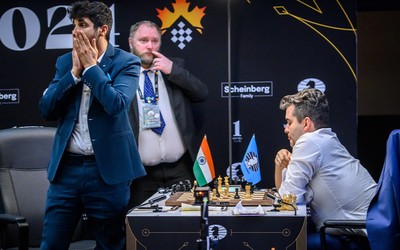
Candidates Round 11: Nepomniachtchi, Tan Back in Sole Lead
Nepomniachtchi and Tan lead alone once again, while Nakamura's win puts him in shared 2nd with Gukesh
Candidates Round 10: Nakamura and Caruana Bounce Back, Lei in Shared Lead
Nakamura and Caruana bounced back with wins against Abasov and Firouzja, respectively, while Lei bea…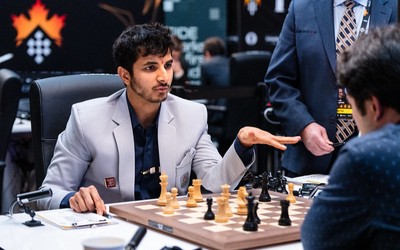
Candidates Round 9: Vidit and Tan Win As Tan Is Back in the Sole Lead
Vidit wins against Nakamura for the second time as the standings at the top of the Open remain uncha…